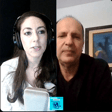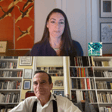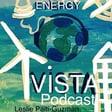Become a Creator today!Start creating today - Share your story with the world!
Start for free
00:00:00
00:00:01

Leslie Chats with Rachel Ziemba on Iran-Israel War, Escalation and Scenarios for Energy Disruptions
In this urgent episode, Leslie Palti-Guzman speaks with macro and energy analyst Rachel Ziemba to assess the #energy #infrastructure implications of the ongoing #Iran-#Israel #war. They go over various scenarios.
Key themes include:
- The strategic shift since October 7 and Israel’s methodical dismantling of Iran’s proxy network and Iran's #nuclear program
- #Maritime #chokepoints under threat: Strait of Hormuz, Red Sea, and Suez
- Impacts on oil supply and pricing, LNG traffic, and risk premiums in global shipping
- The United States positioning and its implications for escalation, deterrence, resolution
This is a must-listen for anyone tracking the collision of geopolitics of energy, commodity trading, warfare, and great power dynamics #Middle East #USA #Gulf
Transcript
Introduction to Energy Vista Podcast
00:00:06
lpaltiguzman
Welcome to en Energy Vista, a podcast on timely energy issues, personal and professional trajectories. I'm your host, Leslie Palti-Guzman. It's June 18, 2025, and time for new Energy Vista episode.
Guest Introduction: Rachel Diamba
00:00:23
lpaltiguzman
so Today, I'm exchanging with Rachel Diamba, the founder of Diamba Insight, a macro advisory firm with a special focus on emerging markets and energy issues.
00:00:34
lpaltiguzman
And if you haven't heard Rachel talking, she's everywhere over the past few weeks to discuss about the Iran-Israel war that we will discuss on this podcast too.
00:00:46
lpaltiguzman
um And she's also associated with NYU and in many other places. Hi, Rachel.
00:00:54
Rachel
Hi Leslie, thanks for having me.
00:00:56
lpaltiguzman
Thanks for coming on short notice. I felt that it was important to have our voice out and contribute to the public debate about this very timely and important development with a war in the Middle East between Israel and Iran.
Operation Rising Lion Discussion
00:01:13
lpaltiguzman
um So we are now in the sixth day of the Operation Rising Lion, the military operation that Israel launched against Iran.
00:01:25
lpaltiguzman
in an effort to prevent another nuclear power. And in Israel wars, it's also to basically strike the head of the octopus of terror.
00:01:37
lpaltiguzman
So for me, the war started really on October 7, when Iranian-backed Hamas carried out surprise attack on Israel. And since then, Israel has been going systematically after each of Iran's proxies.
00:01:52
Rachel
Mm-hmm. Mm-hmm.
00:01:54
lpaltiguzman
the Hezbollah, the Hamas, all have been weakened, decapitated but within their leadership. And we've seen a deployment of spycraft that basically we had only seen in movies so far.
00:02:08
lpaltiguzman
um But recently, ah so for the past six days, it feels different. We have already, you know,
00:02:20
lpaltiguzman
exchange of fires with casualties on both sides, infrastructure casualties.
Debate on Energy Infrastructure Destruction
00:02:25
lpaltiguzman
There has been some energy infrastructure destroyed. um And we don't know how far Israel is willing to go. We don't know yet if the U.S. will join the fight.
00:02:38
lpaltiguzman
And we don't know what Iran will choose to do, ultimately, and how it responds.
00:02:43
Rachel
Mm-hmm.
00:02:45
lpaltiguzman
So I'm very happy yeah you're joining me today because I think both together we can unpack ah a lot on these developments and think about the different scenarios and what it means for each of them, maybe in terms of energy trade and infrastructure risk.
Middle East Conflict Escalation Risks
00:03:03
lpaltiguzman
um And to start, um do you think we're talking a lot about risk of escalation? but without really defining what escalation means.
00:03:13
Rachel
Mm-hmm.
00:03:16
lpaltiguzman
And, you know, since October 7, and even with the war between Russia and Ukraine, escalation has always been like the big fear, like not to give too many weapons by fear of retaliation, not to like to go slow rather than decisive.
00:03:26
Rachel
yeah
00:03:35
lpaltiguzman
So where do you think we're standing right now um within the Trump administration and also like the neighbors of Israel in the region and in the Gulf, like, i is it um like the retaliation and the escalation?
00:03:55
lpaltiguzman
Is it a real perceived threat? And is the oil market for instance in a better place today to so basically resist such impact?
00:04:00
Rachel
Yes.
00:04:09
Rachel
Yeah, well, I guess it depends where you end up on on the escalatory ladder, whether the sort of oil market is as is ready. um Yeah, and i and i and I take your
Iran's Response to Israel's Actions
00:04:20
Rachel
point. I think you're right. I think what's happening now really takes its time back to October 7th or even earlier. But this has been as this is a new phase, right?
00:04:30
Rachel
Israel going after ISIS. um nuclear, you know, sort of certain nuclear facilities, um really um ah sort of removing a set of military and nuclear leadership that has been quite quickly replaced.
00:04:48
Rachel
Right. And I think, unlike with some of Iran's friends in the region, where maybe they were non you know sort of non-state actors or smaller entities, not a full country.
00:05:00
Rachel
I think we're seeing a little bit of the infrastructure of Iran, the size it's of its economy and and how it's responding. But you know I do think we um you know we're seeing a dynamic that maybe hadn't been at play in past exchanges between Israel and Iran of missiles and the like.
00:05:19
Rachel
We saw at least two episodes, right, in the last year that were sort you know, an escalation, but, you know, was sort of one off and done.
00:05:30
Rachel
There was a desire for...
00:05:30
lpaltiguzman
Like more like a tit for tat.
00:05:31
Rachel
Exactly.
00:05:32
lpaltiguzman
Like yeah you do this, one missile, two missiles, like one night, two nights, and that's it.
00:05:33
Rachel
Exactly.
00:05:38
lpaltiguzman
And one...
00:05:38
Rachel
Exactly. and and And not to underemphasize the um the the danger to sort of individuals and the like, but this is a meaningful escalation. So yeah, where do you where do we go from here? It's hard to know, but what I've been spending a all lot of time is thinking about what are the signposts to watch that we're sort of escalating further.
00:05:56
Rachel
um One of them is, as you say, more direct U.S. involvement. I tend to be of the opinion that the U.S. is already quite involved. I mean, there are not U.S. sort of, you know, troops and and U.S. um facilities and and vessels and the like involved.
00:06:11
Rachel
But the provision of military equipment to Israel, the involvement, um you know, i think that that there there's a line that hasn't been crossed yet, but there definitely is U.S.
00:06:22
Rachel
support of this of this mission.
00:06:23
lpaltiguzman
Yeah, I think when people think about involvement of the US, it's is also
Implications of Destroying Iranian Nuclear Sites
00:06:30
lpaltiguzman
basically going after Fordow, which is the f facility which is buried under a mountain.
00:06:34
Rachel
Yes. Yes.
00:06:38
lpaltiguzman
the you know the That would be the prize of the war.
00:06:38
Rachel
yeah
00:06:42
lpaltiguzman
And I think that if Fordow was destroyed or you know taken away as a threat, it could be potentially for Israel, meaning reaching the goal of the the current operation.
00:07:00
lpaltiguzman
That would be a decisive win because it will basically really give a signal that the nuclear program in Iran would be set back for, I don't know in terms of time, but at least for, that that would be exactly what they were looking for.
00:07:18
Rachel
Yeah, I think that's um that that's definitely the sort of um most positive you know kind of of spin on it. I know there's also a lot of questions that even with some of the U.S. military equipment, you know we won't know exactly how you know how how effective. Of course, it might be hard to know, actually, how much um is destroyed, because if it's difficult been difficult enough to get inspector then in the last few years, and Iran has been You know, intransigent about that and was not moving quickly to to to a nuclear deal or the like, um but to know in those those dynamics. So. So, yes, I think you're right. That the question mark of um escalation on the on the on the nuclear side, Florida definitely in the case in point.
00:08:02
Rachel
um Also, I think the question mark we've been watching about what about political leadership? um And I think Israel has been careful. I mean, who who knows to what extent of Israeli choices versus U.S. negotiations versus others.
00:08:15
Rachel
um The other thing I think we're all sort of watching is what about Israel? Iran's export oil, you know, energy infrastructure. We've seen some damage to domestic facilities, though not the largest refineries that are used domestically, ah but the gas refinery um and certain...
00:08:32
lpaltiguzman
So you're referring to South Parse 14.
00:08:36
Rachel
Yes, yes, yes.
00:08:36
lpaltiguzman
Yeah.
00:08:36
Rachel
The South...
00:08:37
lpaltiguzman
which is a
00:08:37
Rachel
Yes. Yes.
00:08:38
lpaltiguzman
Which was interesting because it's the further away from Qatar. Because, you know, Qatar and Iran are sharing this field.
00:08:43
Rachel
yes
00:08:46
lpaltiguzman
um And when you look at the geography of the South Parse and the 14th block, it's like the further away from Qatar.
00:08:49
Rachel
Mm-hmm. Yep.
00:08:55
lpaltiguzman
So, um you know, I think they've been careful also in choosing the target.
00:08:55
Rachel
Correct. Yeah.
00:09:01
lpaltiguzman
um But it shows also that it's not out of the question that we could see some vulnerabilities and you know damage to to the oil and gas infrastructure in Iran and in Qatar could go bigger.
00:09:06
Rachel
Exactly.
00:09:18
lpaltiguzman
But so to come back on the first scenario, like
U.S. and Israel Alliance Possibility
00:09:20
Rachel
Yeah.
00:09:20
lpaltiguzman
for me, it's like total, it's what I call the total submission scenario.
00:09:25
lpaltiguzman
The scenario where it's a quick finale where the US joins the fight, and basically help Israel end the job. and And so with this scenario in mind, what could be the response of Iran?
00:09:42
Rachel
Yeah, I mean, and that's one of these scenarios where depends a lot um on also how much the other damage to the ah the political political infrastructure. It obviously would be a big um loss, of you know, sort of loss of face to some extent.
00:10:00
Rachel
Do they choose at that point to sign some sort of deal where the sort of You know, their their facilities are effectively sort of destroyed. I would see Iran wanting, even in that circumstance, real guarantees of sanctions relief and the like, um and particularly there. But I would say...
00:10:21
Rachel
that would be quite a you know sort of quite a hit to the political you know the the political system, in theory, if it was done. um And there was a pathway that this sort of threat the the nuclear threat was diminished.
00:10:35
Rachel
Then I would think a number of the regional actors, you know even the GCC, wouldn't be unhappy to see Iran's nuclear program put back.
00:10:46
Rachel
But the worry is...
00:10:47
lpaltiguzman
ah
00:10:48
Rachel
the worry
00:10:49
lpaltiguzman
So threat that we just heard today, right, from the regime, that if if the US weren't to intervene, you need to know that we could lash out or like something like that.
00:10:56
Rachel
Yeah.
00:10:59
lpaltiguzman
Do you think there are real concerns of what Iran could do? Would it be, do you think, addressed to the neighbors, oil and gas infrastructure in the neighborhood, in the Gulf, or to US assets and personnel in the region?
00:11:17
lpaltiguzman
Like do it, that could be, i think for me, one of the big risks.
00:11:24
Rachel
Yeah, I think that i think that would be that that would be a risk. I know that's one of the reasons that even as this particular operation was kicking off, the U.S. starting its evacuation or partial evacuation of some of the military facilities, I mean, really only announced effectively the night before this started. So it's hard to tell how much had actually been going.
00:11:44
Rachel
had been materialized. um And, you know, we've seen Iran at different times threaten both U.S. infrastructure but and and and facilities and interests, as well as, um you know, the energy assets of of um of of its neighbors.
00:12:02
Rachel
that hasn't been tested at this point. There's a still open question also of how much, um you know, sort of the missile stockpiles and drones and other, you know, sort of other military equipment, how much of that has been utilized or damaged.
00:12:17
lpaltiguzman
Yeah.
00:12:17
Rachel
There are people who sort of track the energy, of not the energy, the the military response even closer than I that would point or or sort of raise the question of, is Iran and its responses to the different Israeli attacks, are we seeing fewer and fewer missiles as time goes on, and what that might signify?
00:12:35
lpaltiguzman
yeah
00:12:36
Rachel
The other question in this scenario is after, you know, sort of in this scenario of Fordo and the like, would would Israel stop there? What about the missile program? What about the sort of other question marks?
00:12:48
lpaltiguzman
Right.
00:12:49
Rachel
But yeah, so I mean, look, I think...
00:12:49
lpaltiguzman
Yeah. By the way, in this scenario, I mean, for me, Israel is not really after regime change.
00:12:51
Rachel
um
00:12:56
lpaltiguzman
You know, they can talk about it. They have nothing to lose to talk about it. But that's not the end goal, because I think it it requires an internal uprising.
00:13:07
lpaltiguzman
And I think that's also one of the reasons why are not going to go after the Ayatollah right now, because he's already 86. He doesn't have a good succession in place.
00:13:17
lpaltiguzman
I mean, his son doesn't really have legitimacy.
00:13:18
Rachel
no
00:13:21
lpaltiguzman
So it can only help over time crumbling the regime from within. with We will never know how long it will take, you know, like repressive regime, jim like the Iranian regime, and we've seen the past for other regimes like this, it it collapsed, but we never know exactly the timing of the collapse.
00:13:40
Rachel
Well, not only not in the time of the collapse, but also you never know who's goingnna who's going to be next.
00:13:41
lpaltiguzman
ah
00:13:45
Rachel
And a lot of times I would say the history of regime change, particularly forced regime regime change, externally mandated regime change, the what comes next?
00:13:45
lpaltiguzman
Right.
00:13:55
Rachel
I'm not saying it's ah it's as worse as as as before, but it's new issues. And and I would recommend um you know any kind of listener, i pick up Phil phil Gordon's book um from a couple of years ago.
00:14:07
Rachel
um maybe five years ago about sort of the history of regime change in the Middle East. And it's it's sobering reading. And I think it highlights, you know, the need for humility about, you know regime change policies um in that way.
00:14:19
lpaltiguzman
Yeah.
00:14:22
Rachel
Now, again, and and I think there there clearly seems to my mind an interest from Israel's perspective of weakening the regime, of increasing um You know, domestic you know if if it comes with domestic pressure on this, but as you say, the goal is not sort of toppling. That's where I think some of this chatter of those near Trump about how Trump is going to pick a new leader of Iran is not particularly helpful um because, you know, sometimes certain types of threats on ah regime on on a country can actually lead to a rally around the flag impact um and and the like.
00:14:58
Rachel
but But yes, I think you're you're probably right.
00:14:58
lpaltiguzman
Yeah.
00:15:01
Rachel
um the The goal is not regime change per se, but maybe a much weaker Iran that then sets up the motion of maybe domestic you know response that they would um take a different you know sort of take a different course.
00:15:01
lpaltiguzman
So actually and on the trunk.
00:15:08
lpaltiguzman
Yeah.
00:15:17
Rachel
But the risk, I think, in this scenario especially when you've seen the generational change in parts of the military apparatus, sort of um infrastructure is, you know, could they move towards, um you know, living with neighbors a little bit more or do they go more hard line? And that's something, unfortunately, is is hard to predict.
00:15:37
lpaltiguzman
Right. um So on the Trump administration, it seems that there is also a debate, right? On one hand, you know, the for the US joining the fight the fight would also restore potentially US deterrence in the region.
00:15:44
Rachel
I think so.
00:15:55
lpaltiguzman
um You know, we have in mind the evacuation from Afghanistan. and The Houthi are still threatening freedom of navigation, and China is watching.
00:16:06
Rachel
Mm-hmm. Yes.
00:16:10
lpaltiguzman
And you know we know that China has its eyes on Taiwan, a blockade, or whatever the scenario the you know they will put in place in Taiwan, but they are watching what the US can do and the the response from the Trump administration.
00:16:10
Rachel
Yes.
00:16:25
lpaltiguzman
So that's on one hand.
00:16:25
Rachel
Yeah.
00:16:27
lpaltiguzman
On the other hand, there is kind of the MAGA wing, right, that doesn't want to be involved in another war. would prefer returning to the nuclear talks and discussions.
00:16:38
lpaltiguzman
And so that's going to be very interesting to to see what's playing out.
00:16:41
Rachel
Mm-hmm.
00:16:43
lpaltiguzman
In terms of energy issues, um and you know for me, the second scenario would be so the return of discussions.
Potential U.S.-Iran Nuclear Deal Talks
00:16:54
lpaltiguzman
um And then how long will it take?
00:16:56
lpaltiguzman
And what will Iran be able to concede or not? So the weakest they come to the negotiation table, and the more the U.S. will have the upper hand and potentially to so ask for you know the dismantlement of the program, basically.
00:17:16
lpaltiguzman
And that will guarantee also the regime survival, the Iranian regime survival, and kind of a save-the-face exit. And I guess that's the neighbors in the Gulf. That's the, you know, if I'm thinking about the UAE or qat guitar Saudi Arabia, that's maybe also the solution they prefer.
00:17:36
Rachel
their preferred outcome.
00:17:37
lpaltiguzman
Yeah. Because suddenly you will have like less risk around the shred of hormones and any infrastructure heat, know, as long as the discussion continues.
00:17:50
Rachel
Yeah. Yeah, i think that's I think that's right. I mean, there's still the question mark, as you say, of what would Iran be willing to go to to accept? Also, what would what would the U.S.
00:18:01
Rachel
be willing to give? And I don't mean just on um sort of nuclear, whether it's that idea of the say regional consortium on nuclear fuel, which, um you know, there's a lot of questions of how you set that up, but I'm sure from some U.S.
00:18:14
lpaltiguzman
Yeah.
00:18:15
Rachel
officials' perspective, it kills a few few birds with one stone, right? at a time where you have much more civilian nuclear cooperation between the U.S. and some of the Gulf states and desire for more of that.
00:18:28
Rachel
um But I also think and ah part of any face-saving agreement means that the U.S. would have to be willing to do a certain amount of front-loading or might have to do a certain amount of front-loading of some of the sanctions relief or at least a pathway whereby there would actually be an upside economically. And that's not just on the energy side, allowing more investment, but also um a lot of the sanctions have been ah much more difficult to ah get other goods in. Now, of course, Iran's policy choices on the nuclear front, but also how they manage the sanctions, how they
00:19:05
Rachel
protected um the military, the IRGC, the increasing role of the IRGC in the economy frame ah the fact that or shape the fact that most of this um the sanctions disproportionately affected the Iranian people.
00:19:21
Rachel
um But
00:19:21
lpaltiguzman
So on this point, Rachel, can you remind our listener, the IRGC is mostly the one getting the revenues from the oil exports, correct? Benefit.
00:19:31
Rachel
quite um ah sizable you know sort of a sizable portion.
00:19:32
lpaltiguzman
Yeah.
00:19:35
Rachel
It's hard to track exactly how much.
00:19:37
lpaltiguzman
yeah And we know that the IRGC is also involved in some, you know, flooding terrorist attacks abroad.
00:19:38
Rachel
um there
00:19:44
lpaltiguzman
I mean, we had some recent reports, you know, from Germany and other places.
00:19:48
Rachel
yeah
00:19:49
lpaltiguzman
where some plots have been foiled over the past few years. How do you see the sanctions lifting, knowing that the regime stays in place and we have the same kind of terror group, basically, getting the revenues, how do you see that happening?
00:20:11
Rachel
Yeah, and and that might and I think that leads me to a view that we might have a time buying, you know, sort of a diplomatic period of time, um but that it might be difficult coming to a lasting a lasting deal, right? I mean, one of the dynamics, even with the JCPOA, even the sort of biggest supporters of the JCPOA.
00:20:34
Rachel
um You know, really the JCPOA in in that was sort of the last you know decade ago, very much focused on, okay, do a deal on the nuclear side. There's still all these other ways in which Iran is a source of um instability in the region.
00:20:49
Rachel
um and so you had a dynamic where some of the nuclear related sanctions were suspended, right, put on hold temporarily, um but a lot of other sanctions remained in place. And so there's definitely a possibility that could happen again, which would limit the upside benefit. Now, maybe this is also a scenario where, um you know, keeping some of the sanctions in place, suspending them to try to maintain leverage um might be something the U.S. would apply.
00:21:18
Rachel
But um it's still a dynamic that you would almost need to see ah a policy shift and policy changes within Iran, not just about the nuclear program, but also in these other areas.
00:21:31
Rachel
um
Impact on Global Oil Prices
00:21:32
Rachel
We've definitely seen iran's many of Iran's friends in the region be significantly weakened out of the um the many operations that you talked about at the start, um but there still are sort of networks you know networks across the world that they're they're supporting.
00:21:32
lpaltiguzman
yeah
00:21:48
lpaltiguzman
ye
00:21:49
Rachel
And so I think it leads me to a circumstance that maybe be scenario two actually coming to a full, you know, resolution is is a tough one, but it could be ah more of a time buying, you know, sort of operation, which...
00:22:04
lpaltiguzman
So why would you give me why would you give it a chance from the get-go, knowing that militarily and economically, it's the best window of opportunity, potentially, to get rid of the Iranian nuclear program?
00:22:19
lpaltiguzman
You see what I mean? like I feel Israel went so far already, um and we don't have any guarantees that the discussion would lead to anywhere.
00:22:21
Rachel
Yeah.
00:22:29
lpaltiguzman
So why not keeping the momentum now, risking... maybe more infrastructure hits, more disruptions, but at the same time, oil prices, correct me if I'm wrong, but ah from historical standards, you know we're still at $76 per barrel, mean below 80.
00:22:47
Rachel
Yeah.
00:22:48
lpaltiguzman
Not a few weeks ago, shell producers were complaining that oil prices were too low.
00:22:48
Rachel
yeah
00:22:53
Rachel
Yeah.
00:22:56
lpaltiguzman
So the Arabia was starting to see, well, you know our vision 2030, we need a higher oil price maybe.
00:22:56
Rachel
yeah
00:23:01
lpaltiguzman
like so what What do you think?
00:23:06
Rachel
Yeah, so I mean, I think why why not in that context? I mean, I think, um ah so so as so you're saying the energy that you're saying the energy market you know impacts of this scenario. So I mean, I think the challenge with scenario one is this, or you know from a political sort of perspective in the trade-offs is, um well, does it actually succeed?
00:23:30
Rachel
Is this sort of stockpile you know destroyed? How far is the program set back? Does it um put Iran on a path? Does does that, destroy you know, if it's not fully destroyed, does it put Iran on a path that they weren't, you know, at you know they if if they were having the option of having a nuclear weapon and keeping that in play and with leverage, does it put them solidly on the path?
00:23:53
Rachel
I mean, that's always, I think, been been the risk, um you know, um in in that context.
00:23:55
lpaltiguzman
Right. and And what can they do out of desperation?
00:23:58
Rachel
Yeah.
00:23:59
lpaltiguzman
Like what would they do out of desperation?
00:23:59
Rachel
Yeah. Exactly. And that's where I think the regional actors in particular, um and also actors in Europe and other sort of um like that, um you know, alongside this diplomatic effort, we also have this timeline of what about snapback, right, sort of playing out.
00:24:21
Rachel
And before, um you know, the Operation Lion, you know, kind of kicked off, I was ready, um you know, sort of the end of last week to write ah ah yeah know a piece about you know what a snapback looked like. Snapback, meaning the snapback of the pre-JCPOA sanctions at the UN n level that the Europeans and others were looking to to trigger after the censure motion at the um International Atomic Energy Agency.
00:24:50
Rachel
um In practice, ah my view on an economic side is that snapback coming into place wouldn't necessarily move the needle a lot on the on the energy side or the economic side, given the pervasiveness of U.S. sanctions and given Iran's use of the shadow fleet, their sort of dodgy underground um channels in the financial markets.
00:25:14
Rachel
um But, you know, it would create an environment perhaps where Third countries that are hedgers, whether it's intermediaries in the UAE, places like ah Indonesia and Malaysia might be more wary of participating in this trade.
00:25:33
Rachel
But at the end of the day, China doesn't really admit that it's buying energy from Iran, at least in the public statements. So,
00:25:41
lpaltiguzman
Yeah.
China's Role as Mediator
00:25:42
Rachel
you know, this is a different.
00:25:42
lpaltiguzman
So can you confirm that so iran ah China is the largest buyer of sanctioned oil from Iran, correct?
00:25:49
Rachel
Correct. Yes, it's almost the only buyer.
00:25:52
lpaltiguzman
Yeah.
00:25:53
Rachel
ah
00:25:53
lpaltiguzman
Yeah.
00:25:54
Rachel
And i I use, I mean, I think we operate at a time where on the one hand, Iran and its buyers and its intermediaries are constantly innovating and finding ways of subterfuge ah to get the fuel to market.
00:26:08
Rachel
um But it is a good thing that the advent of satellite technology and a lot of different data sources, including many of the things that you, you know, Leslie, have you really pioneered, especially on the gas side.
00:26:20
Rachel
um But, you know, I rely on the sort of good work also on the oil side that people like Vortexa and tanker trackers and other people sort of compile.
00:26:29
lpaltiguzman
yeah
00:26:30
Rachel
And so so we're in this odd circumstance of...
00:26:33
lpaltiguzman
So actually, you remember China had brokered this deal between Saudi Arabia and Iran.
00:26:38
Rachel
Correct.
00:26:38
lpaltiguzman
They have a vested interest in stability in the region. At the same time, I feel that right now they are watching from the side. um They don't really have their say
00:26:46
Rachel
Yeah.
00:26:49
lpaltiguzman
Do you think they could, you know, um do something about it? And what? Or
00:26:57
Rachel
Yeah, I mean, i I think you're right. China is very much on the sidelines. I've had a couple of pretty nondescript statements calling for de-escalation, not even going anywhere near as far as Iran's neighbors and in the Gulf.
00:27:12
Rachel
um Maybe understandably, given that they are so close and you know, near, you know, sort of near near these risk scenarios. um What could get China involved? um That's where I think thinking about the scenario, of whether it's blockage of, ah you know, sort of anything that adds more friction to getting oil and gas out of the the the Gulf, out of the Strait of Hormuz.
00:27:33
Rachel
um ah You know, we can all come up with estimates of um blocking the sort of choke point, actually keeping the strata form was closed seems like a very sort of tall order to me.
00:27:46
lpaltiguzman
Right.
00:27:46
Rachel
um But there's a lot of scenarios.
00:27:47
lpaltiguzman
What about the likelihood of Iran seizing tankers or crew? ah
00:27:53
Rachel
Yeah, exactly what I was about to say.
00:27:54
lpaltiguzman
Yeah.
00:27:55
Rachel
um i think that sub scenario of, as you say, seizing or damaging or, you know, just making there be more, you know, sort of friction and difficulty getting in and getting in and getting out.
00:28:08
lpaltiguzman
yeah
00:28:08
Rachel
um Also, you know, we're we're in a circumstance where drones, right?
00:28:10
lpaltiguzman
I just thought that, don't know if it's
00:28:13
Rachel
ah You know, drones can do a lot of a lot of damage as as we've seen So I think there's a lot of of sort of different sort of risks that Iran or Iranian friends or others could do. So where could I see China eventually getting involved?
00:28:26
Rachel
um if theyre I mean, it's hard to see the U.S. and China together sort of trying to patrol, you know, this these sort of sea lanes in this sort of state of the world. um The U.S. and China, you know, maybe still have a bit of a truce on the trade side, though, you knowll we'll see what's you know, we'll see what's happening.
00:28:46
Rachel
um But I could see China in that context. Would China get involved and provide military equipment? No, I really don't don't think so. um I don't think they're necessarily being asked.
00:28:58
Rachel
I think China's interest...
00:28:58
lpaltiguzman
So actually my third scenario is Iran completely go rogue.
Iran's Potential Alignment with Rogue Nations
00:29:04
lpaltiguzman
And in this scenario, he's finding its rogue friend, right? We can help exactly with weapons or alternative, right?
00:29:12
Rachel
Yeah.
00:29:13
lpaltiguzman
Way out. um And
00:29:15
Rachel
But I don't think it has as many rogue friends these days.
00:29:17
lpaltiguzman
right
00:29:18
Rachel
um but but But I think you're right. It's an interesting, it's a scenario to play out. And we've just talked about why China might not be that rogue friend. They're willing to buy the energy. But China, <unk>m unlike a country like India, that is just buying oil and gas on price and has been quite happy to for its imports from Russia to go from like 5% up to 40% in the last two years, right, because the price was right.
00:29:45
Rachel
um and the shadow fleet could survive, um we really have China keeping diversification sort of a goal. Now, they're not really diversified geographically, right? Because so much of China's oil and and to a lesser extent gas is coming from the Middle East, is coming from the different sides of the the Persian Gulf or Arabian Gulf.
00:30:08
Rachel
um But that context, and so another reason why China wouldn't really enter and support Iran too much is they don't want to undermine their relationships with the Gulf countries, as well as, um and so I would see China being focused more sort of, you know, close, you know, sort of close to home.
00:30:19
lpaltiguzman
Thank
00:30:25
Rachel
Now, that brings us to Russia, though, right, in the rogue scenario, like, is there a circumstance where Russia could provide more support. My sense is Russia's focused on its own issues, not real, if anything, um and you tell me what you think, but I think Russia has more of an interest in trying to emphasize its diplomatic bona fides and how it could maybe help broker deals um part ah as it's going on with the negotiations about Russia and Ukraine.
00:30:55
lpaltiguzman
and i And I don't think Russia wants another nuclear power in the world.
00:30:56
Rachel
But
00:30:59
Rachel
no.
00:31:01
lpaltiguzman
I don't think they are favoring proliferation at all.
00:31:04
Rachel
Yeah. Yeah, I think you're right. And and I think it's hard to think of many places that want another nuclear power, but you're right. I think, you know,
00:31:14
lpaltiguzman
the Europeans, what what do you think of the reactions of the Europeans so far?
00:31:18
Rachel
I think the Europeans are very much on on on the sidelines, maybe not quite as much as as the Chinese, but I think the Europeans are very focused on what's going on in Russia. They're very focused on what's going on economically vis-a-vis China and they're balancing. And so, you know, we've had some statements.
00:31:36
Rachel
You know, I think the Europeans are are walking sort of a line of, you know, reiterating, you know, Israel's right to defend itself. um You know, sort of really still, you know, calling, you know, there there is there was a shift several years ago, even before October seven right where I think the Europeans um became you know more and more worried about Iran's role on the nuclear program, but also because of these assassinations and as well their concerns about human rights within Iran. So we had that shift.
00:32:13
Rachel
And Europe even, with the advent of the Trump administration, i mean, Europe is not standing there saying, well, If
Europe's Cautious Approach
00:32:21
Rachel
U.S. sanctions tighten, we'll do trade with you, Iran.
00:32:24
Rachel
um This is very different, I think, than where Europe was when Trump exited the JCPOA in his first administration.
00:32:33
lpaltiguzman
Yeah.
00:32:34
Rachel
I
00:32:34
lpaltiguzman
and And I think now, you know, we see also real time the damage of the missiles that Iran is doing in Israel right now. Like how, you know, the long range ballistic missiles, you know, that are, I guess we're about the same size, but like eight times our size, right?
00:32:51
lpaltiguzman
Like the image you see, like when they destroy buildings, it's like massive. And, you know, they weigh also like two elephants or more.
00:32:58
Rachel
Yeah.
00:33:00
lpaltiguzman
um So imagine those missiles with a nuclear head on them. I mean, i i don't think, you know, and they could but potentially reach also European cities, right?
00:33:11
lpaltiguzman
Given the distance.
00:33:12
Rachel
Yeah. Yeah. So I think where it leaves Europe is it leaves Europe supporting option two and trying to bring option two really into some more stable, you know, sort of situation.
00:33:23
lpaltiguzman
Wow.
00:33:24
Rachel
Right. And that's where I think their support of snapback and sensor motions and and the like, it so it moves a little bit more slowly than I think Israel would be um comfortable with.
00:33:36
Rachel
um But in that area, I mean, I think the only... maybe plausible scenario where scenario two becomes more stable is one in which whether it is on the side, maybe it's not um massive, you know, direct sanctions relief,
00:33:43
lpaltiguzman
say exist,
00:33:52
Rachel
but a space for some of the GCC countries or others to invest in Iran and try to create some positive, you know, feedback, you know, whoops there, an upside for the population. Now, maybe, as I say, that doesn't necessarily happen without a meaningful policy shift and generational shift.
00:34:08
Rachel
um
00:34:09
lpaltiguzman
when you say
00:34:09
Rachel
But and it does sound like it's a Goldilocks scenario, but i'm I'm sort of trying to play devil's they or the opposite
00:34:13
lpaltiguzman
Yeah. yeah when when you yeah When you say invest, would you see an investment in the oil and gas in Iran?
00:34:22
Rachel
I think, I mean, it's it's always been that odd sort of question mark of do you invest in the same sector where you would be, where it's a competitor, right? Iran and the GCC country is very much competitors.
00:34:34
Rachel
You would see some element um I would anticipate um it might be in the non you it might be in the non-oil sector um even though as well.
00:34:44
Rachel
um yeah Look, on some of the non-oil sector, there has long been this sort of question. you know Iran, if we look back 10, 15 years ago, had much more robust manufacturing sector.
00:34:58
Rachel
It was you know sort of at a lower price point and quality point than oil. um competitors in Asia and elsewhere, but compared to the Gulf, that's basically been trying to create that, those sectors.
00:35:10
Rachel
um But some of it, you know, the the Gulf countries have been known to invest in neighboring countries for well, they want some economic returns, but also for regional stability reasons.
00:35:23
Rachel
And I'm thinking about some of the investments in Egypt, for example, and other things like that.
00:35:24
lpaltiguzman
Yep.
00:35:28
Rachel
So, you know, at this point where the sanctions are, but also the other issues in place, this is not a scenario that can come to pass. But if I'm thinking about when you know I feel like these days especially spend a lot of time thinking about what what are the different worst case scenarios.
00:35:45
Rachel
So it's useful also, even if it's super optimistic, to spend a little time thinking of what's the most plausible upside scenario or um stable scenario and ah regional investment is is part of that story.
00:35:53
lpaltiguzman
Yeah. yeah Yeah. Yeah.
00:35:59
Rachel
But I think there is a lot of things that have to happen between now and then to to get there.
00:36:02
lpaltiguzman
Totally. Yeah. Yeah.
00:36:04
Rachel
think
00:36:04
lpaltiguzman
I have not considered it actually without regime change, but at least on the oil and gas sector. um
00:36:11
Rachel
Yeah. Yeah.
00:36:12
lpaltiguzman
But um were you surprised by the market reactions, like the oil and gas market reaction and pricing so far?
Oil Market Response to Tensions
00:36:21
lpaltiguzman
um Because, they I mean, we've seen a restrain hits on the energy play.
00:36:27
Rachel
yeah
00:36:28
lpaltiguzman
um And traders seem to still maybe underestimate any potential big hits. What do you think?
00:36:39
Rachel
Yeah, I think that's right. um I think markets are still in this show me the outage mode, right? um a You know, which has been the the the story for some years. I think that is partly um because the underlying macro dynamics and the energy energy you know for for energy demand have been weaker.
00:36:58
Rachel
um i shouldn't say energy demand, let's say oil demand.
00:36:59
lpaltiguzman
By the way, that's the same on the guest side. Yeah. yeah
00:37:03
Rachel
Yeah, yeah. Yeah. And I mean, I think where, as you say, you know, gas has had these sort of periods of time where the disruption and distortion of, ah are correct me if I'm wrong, but um of of the Russian supplies coming offline and then the sort of dynamics. But but I think there's a lot of buyers out there um like India who,
00:37:24
Rachel
you know are really price sensitive on on natural gas. you know the The price is not at a point. But yeah, on the oil side. So I think that demand picture um yeah is ah is is is is an issue.
00:37:37
Rachel
I think this element where people have is this line of does it avoid being sort of regionalized? So what I've been thinking about um is having to map these sort of different scenarios. One is a scenario where a meaningful amount of Iran's oil exports are off the market.
00:37:56
lpaltiguzman
Yeah.
00:37:56
Rachel
And the other one is one where you start to um think about difficulty getting some of the GCC oil to market.
00:38:03
Rachel
And what I've been thinking about more recently, um you know, is how... Oil loss from, say, a hit to Karg Island, which would be a big escalator. Karg Island is um Iran's major export facility. They're building an alternate one, but I think it's not ready yet.
00:38:25
Rachel
um And how that's different, say, from a sanctions-related production decline. It's a little bit of a moot point because the U.S., either from willingness and ability, has not been able to take much Iranian oil offline.
00:38:38
Rachel
If anything, Iranian oil exports in the last couple of months are sort of near their, you know, recent, you know, sort of recent highs, sort of back to where they
00:38:49
lpaltiguzman
Do you think the enforcement of sanctions from the US side has declined because of lack of resources or motivation or
00:39:00
Rachel
I think it's a bit of that. I also think it's a lot harder to do meaningful enforcement now that Iran and its Chinese buyers are avoiding the use of U.S. dollars, avoiding the use of G10 financial um equipment and insurance.
00:39:17
Rachel
um If you look at the sort of sanctions that came into place early and or in the Obama administration before that round of nuclear talks, Before that, they used Western financial infrastructure, Western tankers.
00:39:31
Rachel
And so it was a lot easier to sort of use a financial choke point and say, um global banks, you have secondary sanctions against you.
00:39:42
Rachel
if you touch anyone who touches Iranian oil. And now they haven't fully sanctioned proof, in my view, but they've done a lot.
00:39:46
lpaltiguzman
Yeah.
00:39:51
Rachel
So I think there are some, I mean, I think there's clear evidence in my mind that in the Biden administration, there was there was a period of time before October 7th where the willingness to enforce was was was weaker and new loopholes materialized.
00:40:09
Rachel
And then after October 7th, and they had more willingness to enforce, but they really just went after IRGC entities that were supporting the Houthis or Hamas or Hezbollah.
00:40:09
lpaltiguzman
ye
00:40:23
Rachel
They didn't go after overarching ones. And so I think now we're in a circumstance where the willingness is a little bit greater, but there are capacity constraints. OFAC, which is the sanctions enforcement body, and the folks at the State Department are also facing losses of personnel and and and the like, the sort of fiscal and other cuts.
00:40:49
Rachel
Yeah.
00:40:49
lpaltiguzman
Budget cuts, yeah. Mm-hmm.
00:40:51
Rachel
Yeah. um And lots of experienced people who've been doing these these targeting.
00:40:55
lpaltiguzman
and
00:40:57
Rachel
and But I still think there's also a reluctance in the U.S. to go after these big Chinese end users, um to go after a Chinese bank involved in that area.
00:41:09
Rachel
and so so I tend to think it's a mixture of ability and willingness.
00:41:13
lpaltiguzman
Yeah.
00:41:14
Rachel
um And, you know, at times...
00:41:15
lpaltiguzman
And then for for our listeners, what's what's the amount of dependence of China on the Iranian oil or Middle East oil?
00:41:23
Rachel
So Middle East oil, very, you know, quite high, you know, well over, you know, sort of well over 50, well over 50 percent for Iran.
00:41:26
lpaltiguzman
Yeah.
00:41:31
Rachel
You're talking about, you know, 15 percent or so. It ebbs and flows a little bit. um It's definitely some of the cheapest oil that China is buying.
00:41:40
lpaltiguzman
Yeah.
00:41:40
Rachel
um ah But, of course, China is a non is a sizable buyer company. also of Russian oil. And the the sanctions enforcement right now on Venezuela means that China is actually also able to pick up some of that oil.
00:41:56
Rachel
It's a different crude blend.
00:41:56
lpaltiguzman
so yeah So in your two scenarios, either Iran out or both Iran plus the GCC, Are there any alternative all producers that can pick up and and you know you'll be in a sustainable, i mean, you know temporary, but can you can China you know sustain this or not?
00:42:21
Rachel
Yeah, so I think some of it depend depends on um whether there is ah also a hit to GCC supplies, right?
00:42:32
Rachel
I mean, I think that's that's really a global kind of question mark.
00:42:34
lpaltiguzman
Yeah. Yeah.
00:42:35
Rachel
In the scenario where Iran's output goes down noticeably because of sanctions, um there was always the risk that Iran might lash out in some way. But I think if it's because of ah of a sort of military escalation and attack,
00:42:51
Rachel
the risk to um neighboring infrastructure is great. and the only part of the world that has a lot of spare capacity ready to go online in short periods of time is among Iran's neighbors. And so if there is friction getting those supplies out, there aren't a lot of other ah producers who quickly can
Alternative Oil Suppliers
00:43:12
Rachel
ramp up.
00:43:12
Rachel
Now, um I've heard sort of talk that in the short term,
00:43:12
lpaltiguzman
Yeah. Yeah.
00:43:17
Rachel
If Iran's not buying, selling as much to China, maybe, you know, there is some some extra supplies and in Nigeria. We talked earlier about what about the shale producers? Now, they can't necessarily get oil quickly online and start drilling in a couple of months.
00:43:34
Rachel
But, you know, over the course of a year or so, if they felt more confident about the price and demand outlook, ah They could.
00:43:43
lpaltiguzman
Yeah.
00:43:43
Rachel
um We have been seeing the U.S. producers cut back on production. um Some of them, if they were smart, they might well have hedged out their production and locked in some higher prices. That may partly explain some of the shape of the curve. I mean, we'll we'll wait to see.
00:44:02
Rachel
um But i think the issue is it depends why they're having to um why China would be having to replace supplies.
00:44:09
lpaltiguzman
yeah
00:44:13
Rachel
And of course, this price environment is good for Russia as well.
00:44:13
lpaltiguzman
By the way, yeah,
China's Qatari LNG Dependence
00:44:17
lpaltiguzman
yeah.
00:44:17
Rachel
Right.
00:44:17
lpaltiguzman
On the LNG side, China is dependent on 25% from Qatari LNG.
00:44:20
Rachel
Hmm.
00:44:24
Rachel
Hmm. Yeah.
00:44:25
lpaltiguzman
But I don't think you know Iran would strike Qatar. i mean, they have a pretty cordial relationship. They share this gas field that we mentioned earlier. And you know they have a deeper cooperation that I think the public is aware of because of the expansion of the Qatari field.
00:44:40
Rachel
and
00:44:43
lpaltiguzman
That said, Qatar is dependent on evacuating its LNG cargoes out of the Strait of Hormuz. And if there were any disruption or slowdown of p transit through the Strait of Hormuz, that's impacting Qatar.
00:44:59
lpaltiguzman
and And you know we've seen a lot of jamming and spoofing and tankers already um hiding their exact geolocation.
00:45:11
lpaltiguzman
And we've seen that it can lead to collision. I mean, we we're definitely going to see, I think, a slowdown in exports, and we have already seen that a little bit.
00:45:15
Rachel
Yeah. Yeah.
00:45:20
lpaltiguzman
um So yeah, there is clearly an impact for all the players here. And you know it seems to that it will keep going for a couple of days or weeks.
00:45:32
lpaltiguzman
um So we'll keep following this, Rachel. And um thank you for joining the podcast.
00:45:37
Rachel
yeah
00:45:39
lpaltiguzman
Again, it was um kind of last minute, less prepared and more off the cuff. But i think I think it was an interesting conversation to have.
00:45:50
Rachel
Yeah, very, very interesting for me. And I think continuing to track, particularly across the energy space, how this is affecting will be be really important. How um these slowdowns and um the development of almost just in time loading and producers thinking and and and those in the supply chain thinking about um where to keep their infrastructure?
00:46:19
Rachel
Will we start to see traffic jams, you know, sort of in some of the in some of the oceans? As you say, Iran's use of spoofing technologies and other things going on.
00:46:25
lpaltiguzman
Yeah.
00:46:31
Rachel
Russia's use of spoofing technologies elsewhere. um you know, and this is all coming at the time where it's only unilateral policies, but we have the Europeans trying to kind of step up enforcement of the shadow fleet.
00:46:47
Rachel
We have a lot of different things in play. And so maybe it's not just about thinking about outright sort of worst case scenarios, but yeah, um thinking about what happens if things sort of slow down a bit, these sort of different kind of supply chain frictions in this in this space.
00:47:07
Rachel
And that's where I think we're going to be focusing a lot more on also what countries have been filling up their stockpiles. and which ones are forced to fill them up at ah somewhat higher prices.
00:47:17
lpaltiguzman
yeah
00:47:17
Rachel
um And I'm particularly watching China.
00:47:19
lpaltiguzman
And also, not ah yeah. And um you know if if Iran remains a permanent rock state or you know a permanent threat for a longer period of time, I think some buyers of the Gulf countries will have to reconsider their strategically their suppliers, right?
00:47:45
lpaltiguzman
And I think even more diversification of suppliers and routes, because our team routes are a big choke points right now the region.
00:47:51
Rachel
here
00:47:55
Rachel
Yeah, no, no, exactly. And I look forward to in the future talking with you about what some of that diversification looks like and locking up and I'm sure even contracts sort of shifting and people looking for more flexibility.
00:48:07
lpaltiguzman
I
00:48:08
Rachel
But I know we could keep talking for hours, but since till the next time.
00:48:10
lpaltiguzman
know. but yes thank you rachel
00:48:24
lpaltiguzman
this is leslie peltie guzman saying good day and good luck this episode was recorded june 18 2025. eighteen two thousand twenty five



















